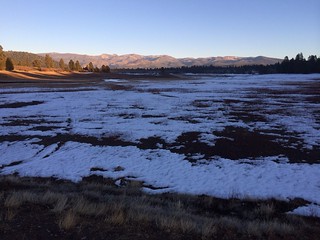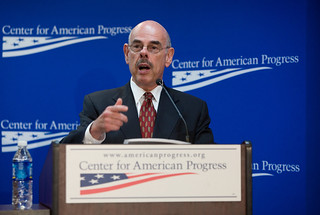 Does Jerry Brown Control the Skies? GOP asks if why he is hiding the water
Does Jerry Brown Control the Skies? GOP asks if why he is hiding the water
by Brian Leubitz
Governor Brown briefly discussed the drought in his state of the state speech, but clearly there is plenty more to be said. The picture to the right is what is passing for the Sierra snowpack these days. But first let’s review what he did say in the speech:
Among all our uncertainties, weather is one of the most basic. We can’t control it. We can only live with it, and now we have to live with a very serious drought of uncertain duration.
Right now, it is imperative that we do everything possible to mitigate the effects of the drought. I have convened an Interagency Drought Task Force and declared a State of Emergency. We need everyone in every part of the state to conserve water. We need regulators to rebalance water rules and enable voluntary transfers of water and we must prepare for forest fires. As the State Water Action Plan lays out, water recycling, expanded storage and serious groundwater management must all be part of the mix. So too must be investments in safe drinking water, particularly in disadvantaged communities. We also need wetlands and watershed restoration and further progress on the Bay Delta Conservation Plan.
It is a tall order.
He goes on to mention that climate change is real, and that we will be facing more variable weather, more droughts, more fires and other extreme weather. But while 2013 was the driest year on record, it is far from being the driest California has experienced. That being said, a UC-Berkeley professor, B. Lynn Ingram, believes that it might be the driest year in 500 years. But that isn’t to say that we know 2014 will be better, or that it was some sort of anomaly.
When Drake landed in California in the 16th Century, it was reportedly as dry, if not drier. But the bigger issue is that the massive 20th century development was based on an abnormally wet century. A century when our droughts were shorter and less severe than the previous millenia:
If you go back thousands of years, you see that droughts can go on for years if not decades, and there were some dry periods that lasted over a century, like during the Medieval period and the middle Holocene. The 20th century was unusually mild here, in the sense that the droughts weren’t as severe as in the past. It was a wetter century, and a lot of our development has been based on that.(B. Lynn Ingram)
Today, that wetter climate supports over 10 million people in LA county alone, in addition to one of the most productive agricultural regions in the world. Yet what happens if 2013 isn’t a blip on the radar, and it is a part of the reversion to the mean? Then we would need to really critically examine our land use patterns and how we collect, store and use our water. But, instead of that critical analysis, the California GOP would rather make this a political issue. Us versus them; agriculture vs environmentalists.
But even if you wanted an us versus them, it isn’t clear that you can stop at just agriculture and protection of endangered species. But, that’s what the GOP is going with. It sounds good enough to draw the most senior Republican in the nation, Speaker John Boehner:
“When you come to a place like California, and you come from my part of the world, you just shake your head and wonder what kinds of nonsense does the bureaucracy do out here?” (Speaker Boehner) said, referring to the long-running diversion of millions of gallons from farms to the habitats of endangered fish.
“How you can favor fish over people is something that people from my part of the world never understand,” he said.(LA Times / Evan Halper)
Nevermind that Ohio deals with issues of endangered species all the time, but the bigger myth is that this is simply an issue of the smelt vs farmers. It is far bigger than that. You have the issues between Delta farmers, who are quite productive themselves, and farmers in the Central Valley, especially the drier southern part of the Valley around Bakersfield. The fish being considered are not just the endangered tiny smelt, but also the salmon runs in Northern California that could be totally eliminated if enough water isn’t granted to the rivers. Once the runs dwindle, it is remarkably difficult to bring them back, even with substantial hatchery programs. And those fish, yeah, they represent jobs to thousands of fishermen.
At any rate, it is hard to argue that Jerry Brown has been some sort of impediment to getting water to the Central Valley farmers. In fact, during the last huge drought, then Gov. Jerry Brown tried to get a peripheral canal built. That was ultimately defeated by referendum in 1982. Had it passed it would have brought massive change to the Delta and a lot of questions of sustainability. The BDCP includes two tunnels around the Delta that would divert fresh water around the Delta. Now, the technology has clearly improved over the past 30 years, but questions about the long-term viability of the tunnels still abound. The junior water users, especially the Westlands Water District in the southern Valley, desperately want change, any change, to move them up the ladder. But will there be enough snowpack in the Sierras to divert all that water to Southern California?
The other major question is storage. In an age when snowpack can no longer be trusted to store our water from February-June, do we need to build a bunch of more reservoirs? Well, again, where does that water come from if we have neither rain nor snow? But even with that question, does storage really change the fundamental questions, or just delay the inevitable? With agriculture accounting for about 80% of water usage, how do we decrease usage without decimating our crop yields? No matter how much we spend on water projects, we will need to get more out of the water we do have no matter what.
Or maybe we will get a lot of rain this week when the high pressure ridge breaks down, and we can go back to pretending that there is tons of water laying around. But in the end, it is hard to imagine that blaming Democrats for a lack of rain will bring Republicans out of their political drought of their own making.
 Reproductive rights activist looks to run for Ted Lieu’s soon to be vacant seat rather than Congress
Reproductive rights activist looks to run for Ted Lieu’s soon to be vacant seat rather than Congress






